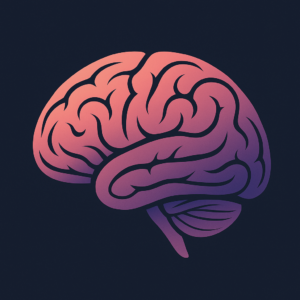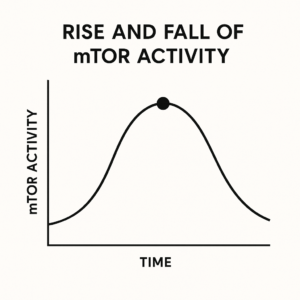
 Let’s talk about something that sounds like a stoner fantasy but is grounded in lab data: THC might actually help slow down brain aging.
Let’s talk about something that sounds like a stoner fantasy but is grounded in lab data: THC might actually help slow down brain aging.
That’s what a group of researchers from the University of Bonn recently explored in a 2024 study on long-term, low-dose THC treatment in older mice. Now, I know—mice aren’t humans. But hang with me.
The research focused on mTOR, a key signaling pathway that governs energy use, synapse formation, and aging. If mTOR sounds familiar, it’s because it’s a major target in longevity science and often shows up in discussions about fasting, exercise, and even psychedelics.
So what happens when you introduce low-dose THC into the mix?
 In older mice treated with consistent low-dose THC, mTOR activity in the brain first increased—triggering energy production and synapse growth—then decreased, mimicking the effects of calorie restriction or physical activity, both known for their anti-aging benefits.
In older mice treated with consistent low-dose THC, mTOR activity in the brain first increased—triggering energy production and synapse growth—then decreased, mimicking the effects of calorie restriction or physical activity, both known for their anti-aging benefits.
Essentially, THC gave the brain a short jolt of “get stuff done” and then helped it chill into an energy-saving, regenerative state.
Meanwhile, mTOR activity in fat tissue decreased throughout, which is wild because fat storage and energy use are tightly linked to inflammation and aging. That decline mirrored patterns seen in animals on calorie-restricted diets—without the actual restriction.
Researchers also found elevated levels of beneficial compounds like polyunsaturated fats and acyl-carnitines—stuff associated with cognitive protection and better metabolism. This wasn’t just a change in mood or memory; it was a metabolic remix of the brain and body.
And even more interesting? The treatment didn’t downregulate CB1 receptors, meaning the brain’s endocannabinoid system didn’t crash and burn after prolonged exposure. That’s often a concern with chronic cannabis use.
Still, this research offers a compelling counter-narrative to the idea that cannabis just fries your brain. If anything, it may help fine-tune it—when used in the right way, at the right time, for the right people.
If you would like to learn more about the benefits and news about herbal wellness subscribe to our newsletter and follow us on socials!
Note from the Author – Thank you so much for taking the time to read my article. Informing the curious is a passion of mine and I look forward to bringing you more to learn about!
Sign up for our newsletter to get the latest from the Rite Innovations team.